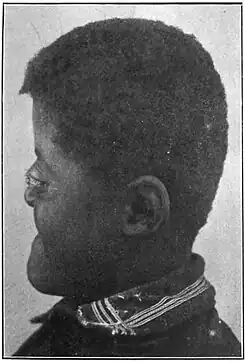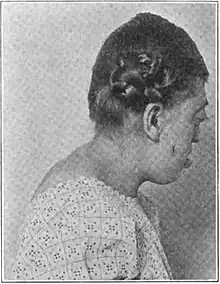| Brachyturricephaly | |
|---|---|
| Other names | High prominent forehead High, prominent forehead Turribrachycephaly |
 | |
| Brachyturricephaly in an 8-year-old female with Acrocephalosyndactyly type I | |
Brachyturricephaly is a form of complex craniosynostosis (a combination of brachycephaly and turricephaly) in which the head has both an abnormally high vertical height and a shortened length from anterior to posterior. Malformations of the occipital region are also often present.[1][2][3]
Conditions

Brachyturricephaly in a 14-year-old female with Pfeiffer syndrome
Brachyturricephaly is seen in the following conditions:[1]
- Acrocephalosyndactyly type I
- Baller–Gerold syndrome
- Craniofacial dyssynostosis
- Craniosynostosis (nonsyndromic) 2
- Lethal osteosclerotic bone dysplasia
- Microphthalmia with cyst, bilateral facial clefts, and limb anomalies
- Osteogenesis imperfecta type 12
- Peroxisome biogenesis disorder 1A (Zellweger)
- Pfeiffer syndrome
- Shprintzen–Goldberg syndrome
- Uruguay Faciocardiomusculoskeletal syndrome
See also
References
- 1 2 "Brachyturricephaly (Concept Id: C1857484)". www.ncbi.nlm.nih.gov. Retrieved 2023-10-14.
- ↑ "Brachyturricephaly - Ontology Browser - Rat Genome Database". rgd.mcw.edu. Retrieved 2023-10-14.
- ↑ Donauer, E.; Bernardy, M.; Neuenfeldt, D. (1993). "T-bone plastique for treatment of brachy-turricephaly". Acta Neurochirurgica. 120 (3–4): 126–131. doi:10.1007/BF02112030. ISSN 0001-6268. PMID 8460563.
This article is issued from Wikipedia. The text is licensed under Creative Commons - Attribution - Sharealike. Additional terms may apply for the media files.